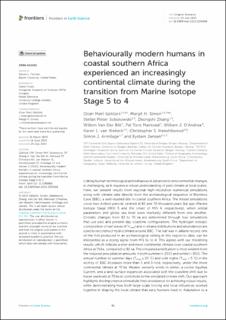Behaviourally modern humans in coastal southern Africa experienced an increasingly continental climate during the transition from Marine Isotope Stage 5 to 4
Göktürk, Ozan Mert; Simon, Margit Hildegard; Sobolowski, Stefan Pieter; Zhang, Zhongshi; van der Bilt, Willem Godert Maria; Mørkved, Pål Tore; D’Andrea, William J.; Niekerk, Karen Loise van; Henshilwood, Christopher Stuart; Armitage, Simon James; Jansen, Eystein
Journal article, Peer reviewed
Published version

Åpne
Permanent lenke
https://hdl.handle.net/11250/3088298Utgivelsesdato
2023-07-25Metadata
Vis full innførselSamlinger
- Department of Earth Science [1050]
- Registrations from Cristin [9791]
Sammendrag
Unravelling evolution-by-environment interactions on the gut microbiome is particularly relevant considering the unprecedented level of human-driven disruption of the ecological and evolutionary trajectories of species. Here, we aimed to evaluate whether an evolutionary response to size-selective mortality influences the gut microbiome of medaka (Oryzias latipes), how environmental conditions interact with the genetic background of medaka on their microbiota, and the association between microbiome diversity and medaka growth-related traits. To do so, we studied two lineages of medaka with known divergence in foraging efficiency and life history raised under antagonistic size-selective regimes for 10 generations (i.e. the largest or the smallest breeders were removed to mimic fishing-like or natural mortality). In pond mesocosms, the two lineages were subjected to contrasting population density and light intensity (used as proxies of resource availability). We observed significant differences in the gut microbiome composition and richness between the two lines, and this effect was mediated by light intensity. The bacterial richness of fishing-like medaka (small-breeder line) was reduced by 34% under low-light conditions compared to high-light conditions, while it remained unchanged in natural mortality-selected medaka (large-breeder line). However, the observed changes in bacterial richness did not correlate with changes in adult growth-related traits. Given the growing evidence about the gut microbiomes importance to host health, more in-depth studies are required to fully understand the role of the microbiome in size-selected organisms and the possible ecosystem-level consequences.
